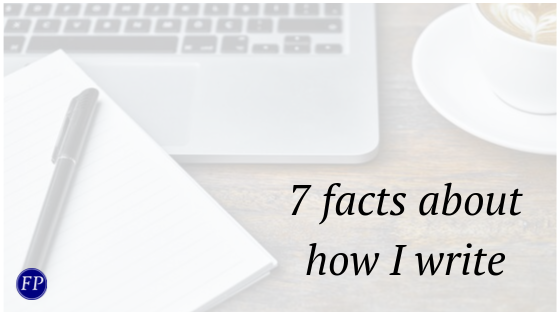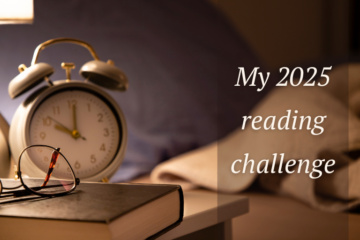7 facts about how I write

When my publisher asked me to create a blog post to explain how I write, I thought, ‘that’ll be simple to answer, I just…’
And then it struck me. There’s no just about it. The act of writing, in fact, the whole process of writing, isn’t just anything. It’s complicated, and meandering, and sometimes a complete mystery.
So instead of discussing the whole mysterious and mystical machination that is writing, I broke it down into 7 facts about how I write.
I think
Or is that daydream? What I mean is that before, during and after the act of writing, I do a lot of thinking about my story. I have this whole internal conversation going on most of the time.
It might be
- snippets of conversation,
- or where the story is going next,
- or changes I need to make to a chapter,
- honing a description,
- or even the name of a character.
Long before I put pen to paper or fingers to keyboard, the action of writing begins with a thought.
Brainstorming
This is probably my favourite bit of the writing process. Before I begin to write, before I work out the plot or what will happen in each chapter, I have a mahoosive brainstorming session where I throw all of my ideas about a story down onto paper.
I use an A3 art pad so there are no lines to limit my scribblings. I write down
- the title of the novel, or ideas about what the title might be
- conversations between characters in my novel
- characters – whether they have a name or not
- settings
- questions the book should answer
- things to include to get the story where it needs to go
- plans for future novels in the series so I know what path to follow
- if this happens, then what? scenarios
- topics I need to research
- mythological beasties
- spells and other magical details
- character descriptions and backgrounds
- details about the world my story is set in
- problems I need to solve in my story
- clues I need to reveal
- locations of off-stage characters
- character family connections
and anything else I need to know before I can begin to write.
It’s only when I’ve regurgitated all of those details that I can begin to build the story.
Later on, I’ll use my brainstorm chart as a reference tool to return to too.
I’m a devoted plotter
I’d love to be one of those people who can just begin a story with no plan, but I always write myself into dead ends and plot holes.
I make a plan of the different stages in the story (what will happen in the beginning, middle and end) and then carve the middle section up into anywhere from three to five sections.
Then I plot the path of my story in a sequential manner (this happens, then that, then that, and so on until the end).
Now, comes the fun bit, working out exactly how I’ll present my story:
- Do I want to start the story-telling at the ‘beginning’ mentioned above, or do I want to start the story later?
- Do I want to jump back and forwards a little?
- Do I want to reveal everything, or will some scenes be shown through witness statements or clue-solving?
- Is the story revealed through one person’s experiences or two simultaneous character paths?
- Finally, does my story end with the ‘end’ mentioned above, or does it go on further?
I’m a firm believer, however, that plotting should always carry a level of flexibility. After all, when a character decides that they want to walk rather than take the train, they’re usually right.
Where I write
I generally write at my computer in my study. I say study, it’s actually the dining room and my desk is the dining table. My family have long since given into the fact that my need for a devoted place to write and work is more important than their need to eat around a table. Maybe one of these days I’ll be able to afford a garden office, or at least a shed.
I tend to switch between typing and handwriting my story, depending on my mood. If I’m struggling over a chapter or section, then making that change usually helps.
Very occasionally, I’ll write in the garden or at my local coffee shop, but generally I find those places too distracting to get any work done.
I don’t wait for inspiration
I’ve learned this lesson from working as a playwright and copywriter with client timescales to meet. I can’t just wait to be in the mood to write or have some wonderful idea to write about. If I did that, I’d rarely get any writing completed.
If there’s writing to do – whether it’s for a copywriting client or the next chapter of my work in progress – I have to just park my bum, pop on my glasses and get on with it.
Boring but true.
20 minute bursts
My writerly brain works best if I write for twenty minutes at a time. Why? Well, twenty minutes allows me to get quite a large chunk of writing done but doesn’t allow me to get bored or distracted. I end my twenty minutes still enthusiastic about my writing and wanting to return to it after my break.
I also find that taking a break allows my brain to cool off enough to solve any problem I may be having with my writing and/or plan out how to continue when I get back to it.
Reading back
When I return to a piece of work after a break, I read back over what I wrote during the previous twenty minute burst. This serves a number of purposes:
- It reminds me where I left off.
- It gets me back into the same tone of voice and pace of writing.
- It allows me to check that the last twenty minutes weren’t wasted and that I didn’t get off track.
It might take a little extra time to read back but it always helps me to continue with whatever I’m working on.
*
So there you have it. This is some of how I write.
Visit my Books page to find out exactly what my novel is about.



4 Comments
Lisa Wright · 21st September 2019 at 10:34 pm
I’m a panster who wrote 8000 words on a whim of continuing the longest collaboration Friday ever (and lots of other stuff inc poetry) and then studied my craft and then character labbed and then worked out a plot. I jump all over. I am going to sort this out but I haven’t worked out all the details. I just sit and write every day. I also switch back and forth between notebooks and pc. I have a desk in my bedroom and I mostly work there. I can’t understand how people write in coffee shops etc. if i read what I have written I have to edit straight away. If this gets finished I will be as shocked as anyone.
I see the advantages of being a plotter and brainstorming it makes more sense than what I did.
fifiphil · 23rd September 2019 at 9:56 pm
Everyone has their own method. This is just mine. Good luck with your writing.
Nancy Hinchliff · 24th September 2019 at 1:25 pm
Fiona, I enjoyed reading about how you write. Compared to my own way, yours is so much more organized. I am not a plotter and rarely even make an outline. I think part of that is because I write memoir.
fifiphil · 30th September 2019 at 10:41 am
I love your writing, Nancy. Everyone is different. You have to find the method that suits. 🙂
Comments are closed.